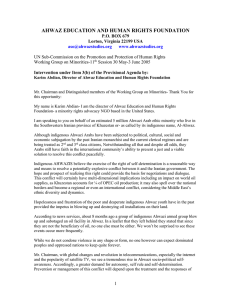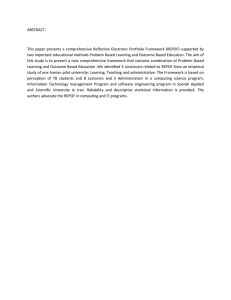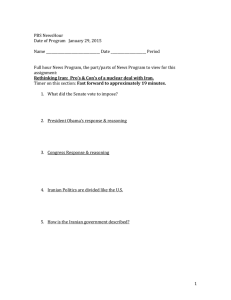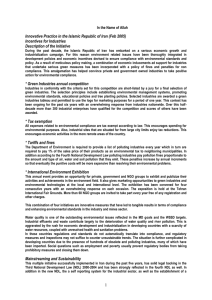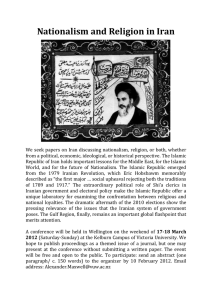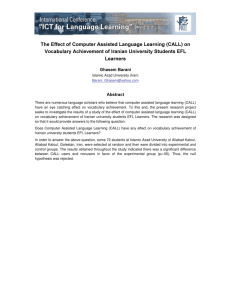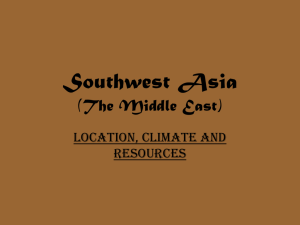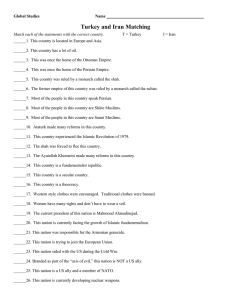AHWAZ EDUCATION AND HUMAN RIGHTS FOUNDATION
advertisement
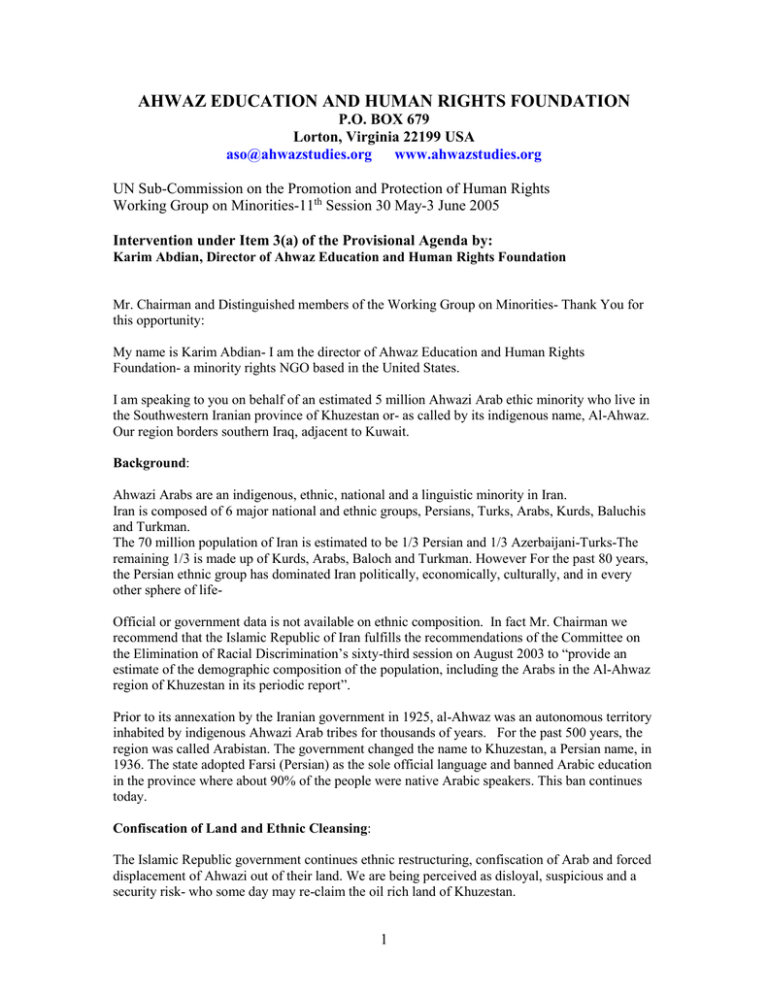
AHWAZ EDUCATION AND HUMAN RIGHTS FOUNDATION P.O. BOX 679 Lorton, Virginia 22199 USA aso@ahwazstudies.org www.ahwazstudies.org UN Sub-Commission on the Promotion and Protection of Human Rights Working Group on Minorities-11th Session 30 May-3 June 2005 Intervention under Item 3(a) of the Provisional Agenda by: Karim Abdian, Director of Ahwaz Education and Human Rights Foundation Mr. Chairman and Distinguished members of the Working Group on Minorities- Thank You for this opportunity: My name is Karim Abdian- I am the director of Ahwaz Education and Human Rights Foundation- a minority rights NGO based in the United States. I am speaking to you on behalf of an estimated 5 million Ahwazi Arab ethic minority who live in the Southwestern Iranian province of Khuzestan or- as called by its indigenous name, Al-Ahwaz. Our region borders southern Iraq, adjacent to Kuwait. Background: Ahwazi Arabs are an indigenous, ethnic, national and a linguistic minority in Iran. Iran is composed of 6 major national and ethnic groups, Persians, Turks, Arabs, Kurds, Baluchis and Turkman. The 70 million population of Iran is estimated to be 1/3 Persian and 1/3 Azerbaijani-Turks-The remaining 1/3 is made up of Kurds, Arabs, Baloch and Turkman. However For the past 80 years, the Persian ethnic group has dominated Iran politically, economically, culturally, and in every other sphere of lifeOfficial or government data is not available on ethnic composition. In fact Mr. Chairman we recommend that the Islamic Republic of Iran fulfills the recommendations of the Committee on the Elimination of Racial Discrimination’s sixty-third session on August 2003 to “provide an estimate of the demographic composition of the population, including the Arabs in the Al-Ahwaz region of Khuzestan in its periodic report”. Prior to its annexation by the Iranian government in 1925, al-Ahwaz was an autonomous territory inhabited by indigenous Ahwazi Arab tribes for thousands of years. For the past 500 years, the region was called Arabistan. The government changed the name to Khuzestan, a Persian name, in 1936. The state adopted Farsi (Persian) as the sole official language and banned Arabic education in the province where about 90% of the people were native Arabic speakers. This ban continues today. Confiscation of Land and Ethnic Cleansing: The Islamic Republic government continues ethnic restructuring, confiscation of Arab and forced displacement of Ahwazi out of their land. We are being perceived as disloyal, suspicious and a security risk- who some day may re-claim the oil rich land of Khuzestan. 1 In the past fifteen years alone, over 250,000 hectares of Ahwazi farmers land in regions of Jufir, Shosh, Hoizeh, and Hamidieh…have been confiscated and given to Persian settlers. This is done in violation of the article 4.5 of the United Nations Declaration on Minorities. (1). Recently a top-secret letter from President Khatemi’s office was leaked out outlining ethnic restructuring and forced displacement of Arabs to Isfahan, Tehran and Tabriz and other nonArab provinces aiming to reduce the Ahwazi Arab population from a 70% majority in Khuzestan to a 1/3 minority- in a period of 10 years or less. Settlements such as Ramin-2, Shirin-Shahr and others have already been built- and nearly one million Persians have been moved into Ahwazi. I submit a copy of this document to the secretariat for WGM for its consideration. (2) The policy of the Islamic Republic, like its predecessor, is directed at the eradication of the national identity and forceful assimilates of Ahwazi-Arabs, and to a lesser degree, other nationalities such as the Turks, Kurds, Baluchis and Turkmen. Our children are being deprived from the use and study of their mother language and our people are being denied participation in public life and in decisions affecting them. While the illiteracy rate in Iran is said to be about 18-20% this rate is 60% for Ahwazi men and much higher for the women. 30% of Ahwazi children drop out of school in elementary years, 50% in middle school and 70% at high school. In violation of articles 2.2 and 2.3 of UNDM, as well as articles 15 and 19 of the constitution of the Islamic Republic-governor general of Khuzestan, all other province’s political, military and security commanders, officers, mayors and all high and mid-level government officials of Khuzestan, have consistently been appointed from non-Arabs outside of the native Arab population. Ecology, Diversion of Rivers and Poverty: Ahwazis live in extreme poverty, lack basic services such as electricity, telephone, have no schools, hospitals or health clinics – while their ancestral land produces 4 million barrels of oil per day and funds 90% of Iran’ economy- none of this wealth, is allocated to the Ahwazi people or their region. They do not share the riches of their land. The regime erected dams on Karkhe River that passes through an entirely Arab area of Howizeh and Boustan and is selling the water to Kuwait- and other Gulf states and now the Iranian parliament is debating diversion of Karoon River, the largest river in Khuzestan, to the central Persian provinces. 80% of the children in Khuzestan suffer from malnutrition according to Dr. Balali, director of Dasht-Azadagan Health network in Iran. Seventeen years after the war with Iraq, only 20% of the Arab-populated border towns and cities damaged or destroyed during the war have been restored. Furthermore, according HRW and Land Mine Monitor, “Millions of Land mines remaining from the Iran-Iraq war in Khuzestan kill and maim indigenous inhabitants of Khuzestan in southwestern Iran every day”. 2 The government is still holding hundreds of square kilometers of Ahwazi lands occupied during the Iran-Iraq war along the border of Iraq while hundreds of thousand inhabitants of these areas still live in Mashhad, Shiraz, Karaj and Isfahan and aren’t permitted to return to their homes and villages. Our demands for basic human rights, including education in our mother tongue, have often been labeled as "separatist”, “secessionist” or called “stooges of foreign countries” or “danger to security and territorial integrity”. Iranian government imposed a silence and a news blockade in the national and international media against the existence of Arabs in Iran. Massacre of April 15, 2005 in Ahwaz and other recent Events: Mr. Chairman: On April 15, 2005, last month, in the provincial city of Ahwaz, about 4000 Ahwazi Arabs demonstrated peacefully against diversion of their water resources and against ethnic restructuring and against poverty. Iranian security forces opened fire on unarmed demonstrators killing at least 61 men, women and children, injured over 800 and arrested thousands, according to Amnesty International, Human Rights watch, BBC and other wire services. Local activists put the killing at least 150. The government asks the families to pay $1800-bullet money- to return the bodies to their families. At least 2 Rrevolutionary Guard (Sepah) divisions and a large security force have been deployed to the area. Khuzestan is currently under siege and cordoned off- No reporter is allowed into Khuzesatn. Mr. Youssef Azizi Banitorof, a well-known indigenous Ahwazi writer, journalist and researcher has been detained in an unknown location since 23 April for criticizing the killing of peaceful demonstrators. Recommendations: We urge-and recommend the following: 1. - That visit of Special Reporter on Summery and Arbitrary Executions to Iran, be expedited and include in his agenda a visit to Khuzestan to investigate the killing of over 60 Ahwazi Arab demonstrators and the faith of the detainees and the missing.. 2. –To end the state of siege and redeploy military and security forces out of the province. 3.- Investigates the authenticity of the government directed ethnic cleansing policy against Ahwazi Arabs stipulated in the recently leaked internal top-secret document from President Khatemi’s office. 4. - That the Islamic Republic of Iran allocates a portion of the oil money to alleviate extreme poverty among the indigenous Ahwazi Arabs. 5. - Free all Ahwazi detainees arrested during and after the April 15 peaceful demonstration including Mr. Youssef Azizi-Banitoruf Thank You ……………………………………………………………………………………………… (1)- ). According to Mr. Sahdidzadeh, Khuzestan former member of the Iranian parliament please see: www.ahwazstudies.org/english.shadidzadeh.letter for details on land Confiscation. (2) For the original and the English translation, please see: www.ahwaz.uk. (3) The aim is "Persianization” or “Farsization”, where everything must be Persian. 3
